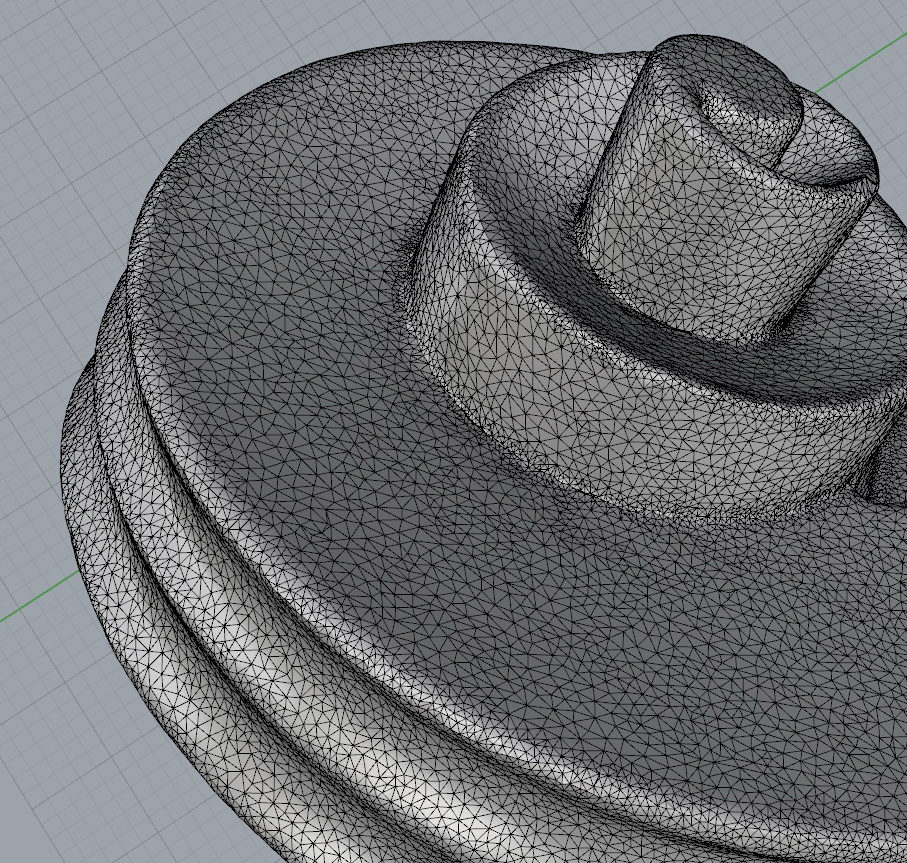Page 1 of 6
Projecting an SLS system: Scanning precision
Posted: 14 Mar 2017, 16:03
by mading
Hi to everybody!
I'm going to build my SLS system. I had to choose my projector.
Camera will be the Imaging source DMK 23UX236, with 12 mm lens.
I'm going to scan objects raging from 150x40x60 to 1400x450x180.
According to the forum experiences with different projectors and mods, is it possible to scan an unvarnished ("white") viola scroll with this definition?

Scroll is 40 mm wide.
It was scanned with this system:
http://www.scanner3d.it/it/scanner3d/cronos-3d.html
http://www.scanner3d.it/brochures/cronos-ita.pdf
You can see the hardware specific in the above links.
Thanks to All!
Re: Projecting an SLS system: Scanning precision
Posted: 14 Mar 2017, 17:31
by Micr0
This should be pretty easy to do. Is this your only question?
Re: Projecting an SLS system: Scanning precision
Posted: 14 Mar 2017, 20:15
by mading
The most intriguing part is dealing with dark and polarized reflective surfaces: varnished wood.
I can't use any matting agent. Too risky for varnish.
I heard somebody's using Red or InfraRed color patterns to better deal with it.
Is it something "magic" or real optics?
Re: Projecting an SLS system: Scanning precision
Posted: 14 Mar 2017, 21:33
by Micr0
Infrared lasers maybe. Creaform has a hand held that can scan black gloss plastic fairly well. It is also about $60K. Could you perhaps use a dry powder like talc? You wouldn't have to completely whiten the surface. Just use enough to make the surface a little less absorbent and less reflective.
Re: Projecting an SLS system: Scanning precision
Posted: 15 Mar 2017, 08:06
by mading
So theorethically an IR line laser with a IR sensible sensor (and IR-transparent optic) should work?
We tried with Boron - Talc Powder: not enough resolution.
For the moment it will be enough to scan unvarnished instruments or gypsuym casts.
Re: Projecting an SLS system: Scanning precision
Posted: 16 Mar 2017, 02:36
by Micr0
mading wrote: ↑15 Mar 2017, 08:06
So theorethically an IR line laser with a IR sensible sensor (and IR-transparent optic) should work?
We tried with Boron - Talc Powder: not enough resolution.
For the moment it will be enough to scan unvarnished instruments or gypsuym casts.
Talc can be a bit course. Chalk too. I found a dry white pigment at an art supply that was extremely fine.The problem I had was that it was so fine it got into every crack and took a bit of effort to remove. The parts I used it on were fine going though the ultrasonic cleaner so that helped. In retrospect I also could have only dusted the part with the powder and not tried to get it totally white.
Re: Projecting an SLS system: Scanning precision
Posted: 16 Mar 2017, 02:37
by Micr0
mading wrote: ↑15 Mar 2017, 08:06
So theorethically an IR line laser with a IR sensible sensor (and IR-transparent optic) should work?
We tried with Boron - Talc Powder: not enough resolution.
For the moment it will be enough to scan unvarnished instruments or gypsuym casts.
There's also spray dry shampoo. Though it is sometimes suspended in an alcohol medium which may not be good for a vintage varnish.
Re: Projecting an SLS system: Scanning precision
Posted: 16 Mar 2017, 07:11
by avogra
There is also this spray, they use to detect leaks, which evaporates after some hours without any residue. I haven't used it myself though.
Re: Projecting an SLS system: Scanning precision
Posted: 16 Mar 2017, 09:46
by mading
Well, let's say I can't put anything.. I'm sorry but it's too risky.
Has anybody tryied a DIY IR laser setup?
Or IR LED DLP Projector?
Re: Projecting an SLS system: Scanning precision
Posted: 16 Mar 2017, 12:20
by avogra
I just looked up, what the stuff ist called. It is Cyclododecane. I think it is possible, that it has no effect on the varnish. From what I read, it is a solid powder that evaporates into gaseous form after some time. Wikipedia says, it is used to conserve sensitive archeological objects temporarily or in art restoration. Both seem to belong to a class of objects that are at least as sensitive as music instruments. Maybe further research can confirm if this stuff is comaptible with the kind of varnish used for antique music instruments.

